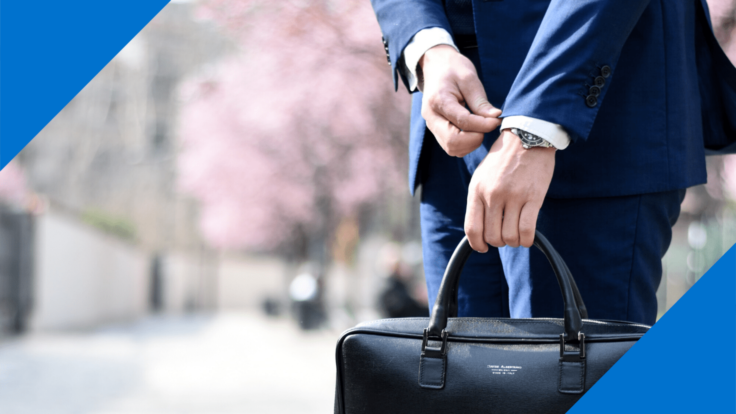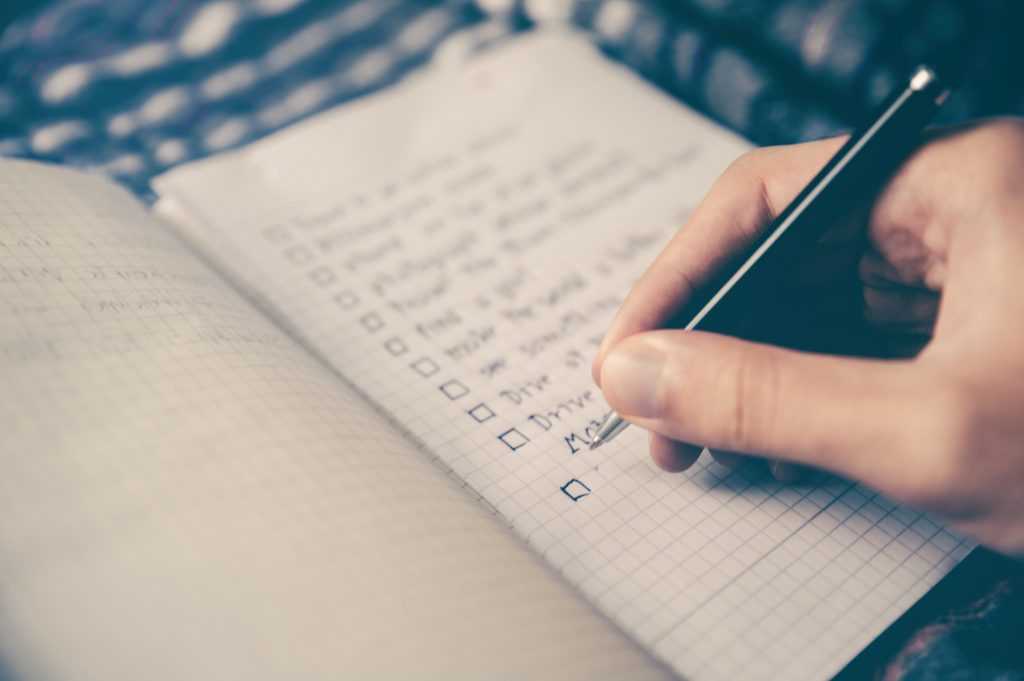Today’s the big day — you’re going on-site for a formal job interview.
To get to this point, you’ve already come a long way. Your resume stood out among hundreds of other applicants and you made it past the initial phone screen.
Now, it’s time to take the next (most important) step toward landing that job offer: knocking the interview out of the park!
The question is… are you prepared?
Job interviews are inherently high-stake moments. As such, every detail counts — including the items you bring with you. Even if you feel confident and qualified for the role, it would be a big mistake to show up empty-handed.
In this article, we’ll walk through the essential ‘job interview toolkit’ and everything you should bring to an interview including:
- What items/materials to bring
- What information to have on-hand
- What NOT to bring
- How to prepare for your interview ahead of time
- A handy checklist to review on your interview day
Let’s get started!
Items To Bring To A Job Interview
No matter what role you’re interviewing for, you should always have the following items with you, regardless of the circumstances:
1) Briefcase or Shoulder Bag. For starters, you’ll need a bag to carry the rest of the items on this list. Make sure your bag looks professional — avoid bright colors and kitschy designs (e.g. pop culture logos).
2) Document Folder. You’re going to have important papers with you (e.g. copies of your resume, list of references, etc.), so you’ll need a sturdy folder to keep those papers crisp, neat, and organized.
3) Copies of Your Resume. Your interviewers will probably bring your resume to the table with them — but it’s still important to have extra copies ready. Bring five copies of your resume to ensure you’ll be able to distribute it at a moment’s notice.
4) Business Cards. Similar to the above, your interviewers will likely already have your contact information. But handing out a business card is still a classic display of professionalism that can help you stand out from the other candidates.
5) List of Questions. Remember, an interview is a two-way dialogue. It’s crucial to have a series of thoughtful questions to ask your interviewer regarding the role, team, and company. Having these questions prepared ahead of time will show diligence and keep the conversation on a good track.
6) Work Portfolio. If you’re applying to a creative position (e.g. graphic designer, writer, etc.), you’ll definitely need to bring a portfolio of your best work. But a portfolio isn’t strictly limited to creative pieces. You can also put together a collection of performance reviews, awards, outlines of notable professional achievements, or a Value Validation Project.
7) List of Professional References. If you don’t have references included in your resume, list them on a separate sheet and make multiple copies. Providing this reference list at the end of the interview will leave a strong final impression.
8) Notepad and Pens. Jotting down notes is a great way to show that you’re engaged in the conversation and taking it seriously. But do this sparingly — you should spend the majority of the time making eye contact with your interviewers.
9) Photo ID. Some office buildings have security protocols that require a photo ID and sign-in upon arrival. Be sure to bring your driver’s license (or other valid government ID) to ensure a smooth check-in.
10) Phone (on Silent Mode). It’s a given that you’ll have your phone with you. So, this is a reminder to put your phone on silent mode. Any rings/vibrations during the interview will be very distracting and unprofessional.
11) Handkerchief / Napkins. Among other uses (like sneezes), a handkerchief can help keep your palms dry for those important upcoming handshakes.
Tip: applying a small amount of antiperspirant on your palms in the morning can keep clamminess at bay!
12) Your Reference Sheet. You probably won't be asked for your references on interview day, but it doesn't hurt to have a copy on hand. Either way, you should absolutely have a digital copy of your references ready to go so you can email them to the hiring team at the drop of a hat. Your references should be on their own sheet, here's a guide on choosing the right references and formatting your reference sheet!
Important Information to Have On-Hand
In addition to the items above, you should also have the following information readily accessible:
1) Office Address and Directions. Don’t just wing it with Google Maps on the big day. You want to do your research ahead of time! Write down the office address and unit number, and review the location/directions before you depart.
If you're able, do a test run in person ahead of time. Head over to the office and get familiar with the street, the building, and where you'll be going on interview day. If you're not able to make it in person, use the street view on Google Maps to get an idea of what the street looks like, where the office is, and plan your route. I always planned to arrive 15-20 minutes ahead of my interview in case anything happened.
2) Phone Number of the Front Desk or Content. You may need to call the front desk or the contact you'll be interviewing with if you have trouble finding the address or encounter other issues (e.g. restricted access to the parking lot/garage). Adding them as a contact in your phone will make it easy for you to find their number instead of having to dig through your email.
3) The Names of Your Interviewers. In order to properly introduce yourself (both at the front desk and in the interview room), you’ll want to mention your interviewers’ names. You can ask your recruiter for the names of the people you'll be interviewing with ahead of time. If they're not willing to share that information, they should be willing to share a contact that you'll meet the day of which is a good start. Write down the names that you get and do some research on each person ahead of the interview!
4) The Emails of Your Interviewers. After your interview, you're going to want to send a post-interview thank you email. This is the polite thing to do, but it will also help you stand out! According to a survey on hiring, only 24% of candidates actually sent thank you notes while 80% of hiring managers factored thank you's into their decision. You want to be in the 24% of people who do send them!
The easiest way to send a thank you note is via email so you want to make sure to have your interviewers emails on hand, whether you got them from the recruiter ahead of time or from the interviewers themselves. Whatever you do, don't walk out of your interview without that email address!
But if you do, you can always use Mailscoop.io to try and find it 🙂
Things You Should NOT Bring To A Job Interview
Now that we’ve covered the essential items you should take with you to a job interview, let’s review what you should avoid bringing:
1) Hat / Cap. Even if you know the company has a casual dress code culture, you should never wear a hat to an interview. That includes baseball caps, beanies, fedoras, or any other hat styles.
2) Large / Flashy Jewelry. Small rings, earrings, and necklaces are generally okay to wear — but keep it subtle. A job interview is not the place for big hoops, bulky gemstones, heavy pendants, etc.
3) Earpiece / Headphones. Bringing your Bluetooth earpiece/headphones for the commute is fine — but make sure to take any devices out of your ears and stow them in your bag before you arrive (and don’t listen to music while you’re waiting for your interviewers).
4) Chewing Gum. Feel free to chew gum beforehand to keep your breath fresh — but get rid of it when you arrive at the office. It would be very unprofessional to have gum in your mouth during an interview, or even worse, have to spit it out!
5) Coffee or Food (In-Hand*). You can bring coffee in a thermos if it fits in your bag, but don’t show up holding a cup of coffee in your hand. Likewise, you can bring a light lunch or snacks — but all food should be packed neatly away in your bag and sealed with a Tupperware container to suppress any odors.
How To Prepare For Your Interview In Advance
In this article, we've outlined the essential items of what to bring to an interview that will help ensure a smooth, successful meeting.
But, while important, this list is only one piece of the puzzle when it comes to comprehensive job interview preparation (and follow up).
For more information on how to ace the job interview process from start to finish, check out these additional resources for further reading:
- 14+ PHONE INTERVIEW TIPS
- HOW TOP PERFORMERS PREPARE FOR JOB INTERVIEWS
- WHAT TO WEAR TO A JOB INTERVIEW
- THE MOST EFFECTIVE POST-INTERVIEW THANK YOU EMAIL
Interview Day Checklist
Are you looking for a printable checklist to help make the big interview day easier?
Click here and download our free “What To Bring To An Interview” checklist!





























